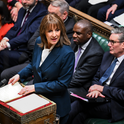In bemoaning the “tough choices” needed to fill the £22bn “black hole” she says she inherited from the Tories, Rachel Reeves turned Keynes upside down this week. “Anything we can actually do, we can afford” was the mantra of the great economist beloved of the left. Whether consciously or subconsciously repudiating Keynesian positivity, Reeves kept repeating: “We can’t do it if we can’t afford it.”
So is Tory austerity being replaced by Labour austerity?
This is the cry of left critics, including a group around former shadow chancellor John McDonnell, who voted against the King’s Speech last week. They recite the list of things Reeves says we can’t afford, starting with an end to the two-child limit to Universal Credit welfare payments, which is widely held to be one of the main causes of escalating child poverty. Then there is the means-testing of winter fuel payments for the elderly, something Labour criticised when Jeremy Hunt was supposedly considering such a move last year.
Then there are the major infrastructure projects now being suspended or cancelled, including even the new hospitals promised but not delivered by Boris Johnson.
Since combatting child poverty and “backing builders not blockers” were Labour election themes, a charge sheet is fast developing. The refusal to contemplate higher income tax, even on the very rich, is high on the list too.
However, it is far too soon to make the austerity claim. On the contrary, most of Reeves’s £22bn “black hole” was dug by the chancellor herself, in the form of her decision to accept the large public sector pay increases just recommended by the expert pay review bodies. On top of this, she also agreed to a huge 22 per cent pay increase to end the junior doctors dispute. Neither of these were funded by the outgoing government, and Rishi Sunak and Jeremy Hunt would almost certainly not have been so generous. We know this because they spent two years enduring doctors’ strikes to resist just such an increase.
Nor is it yet clear that further welfare and infrastructure spending, and progressive taxation, are off limits. There is to be a budget at the end of October, which will be the major tax-and-spend launch event of the government. A child poverty cabinet committee has been set to work immediately. And though some major infrastructure projects have been suspended pending review before the budget, few have been cancelled. This limbo status includes HS2 and all those new hospitals.
The scope for tax increases on the better off remains considerable. And indeed cuts in benefits for the better off, like the universal winter fuel payments for the elderly. Capital gains and property taxes are highly likely to increase, and neither would break Labour’s election pledges.
The question is by how much Reeves will increase taxes in October, and whether there will still need to be big spending or infrastructure cuts once her tax strategy is in place.
The only thing we really know from this week’s preliminary financial statement is that Reeves is determined not to confront public service workers and trade unions. So the worst-case scenario won’t be unmitigated austerity. And she is equally determined to pin the blame for any initial tax increases and spending cuts on the outgoing Tories—which is just good politics.














